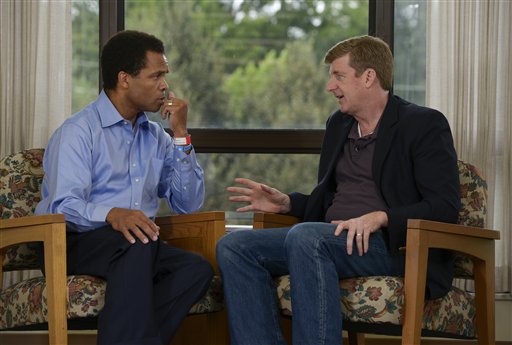
CHICAGO (AP) — U.S. Rep. Jesse Jackson Jr. is in a “deep” depression and has “a lot of work” ahead of him on the road to recovery, former Rhode Island U.S. Rep. Patrick Kennedy said Thursday after visiting the hospitalized Chicago Democrat.
Jackson has been on a secretive medical leave since June 10, when family members said he collapsed at their home in Washington. He is currently being treated for bipolar disorder at the Mayo Clinic in Rochester, Minn. But neither his office nor family members have said much about his medical condition.
The visit from Kennedy — who has suffered with bipolar disorder and been treated at Mayo — gave one of the first outside glimpses of Jackson’s health.
“I don’t think people understand the depth of his depression. It’s deep. He has a lot of work to continue to do to be able to learn how to treat this illness in the most effective way possible,” Kennedy told The Associated Press. “Depression is a serious thing, and I’m glad that he’s taking it seriously.”
Kennedy also suggested Jackson had an initial reluctance to receive help for his illness.
The congressman’s wife, Chicago Alderman Sandi Jackson, issued a statement through spokesman Kevin Lampe about Kennedy’s visit: “My husband is grateful for his friendship. He and Jesse have a long history in Congress together.”
Jackson’s spokesman declined to comment Thursday, and it’s uncertain when Jackson can return to work. Last week, an aide said the congressman could be expected back at work in a matter of weeks. But after the Mayo Clinic released a detailed diagnosis of his health, his spokesman declined to comment. Jackson’s father, the Rev. Jesse Jackson, also has declined to speak on the topic.
Kennedy, who served with Jackson on the House Appropriations Committee, left Congress last year. He has been an outspoken advocate for mental health and spoken publicly about his own struggles.
He’s said he and Jackson have similarities: They both come from famous families and have suffered from the same disorder.
“It was clear we both had the same feelings of dejection and self-doubt and being in a situation where we thought we had let people down and let ourselves down,” Kennedy said. “It’s going to take him some time to heal.”
Kennedy called Jackson a resilient person with “terrific self-awareness” and said he was confident Jackson will come back from this.
“He recognizes the challenges that he faces. That’s a big step on the long road to recovery. He’s doing the work so he can take that journey forward,” Kennedy said. “He’s getting stronger and he’s getting the support he needs to put together a program of recovery.” Kennedy added that Jackson’s family had been to visit him many times.
The congressman’s office has said little about Jackson’s absence aside from short emailed statements. His office remains open for constituent services, and his aides have continued communication with officials in his district, which includes parts of Chicago and its southern suburbs.
His office initially described the condition — two weeks after he went on leave — as treatment for exhaustion. Later, it was referred to as a “mood disorder.” Jackson, 47, spent time at the Sierra Tucson Treatment Center in Arizona before his office announced late last month that he was transferred to Mayo.
It was only this week that the Mayo Clinic specified his condition as Bipolar II. The condition affects parts of the brain controlling emotion, thought and drive.
Kennedy said it appeared that Jackson wasn’t initially ready to acknowledge that he needed medical care.
“He’s been through kind of a metamorphosis. The notion that he was getting mental health care was very distasteful,” Kennedy told the AP after the visit with Jackson, which lasted more than an hour Thursday afternoon. “He did not want to acknowledge that this was the kind of help he needed. It took a public outing.”
In their few public comments about his illness, family members have pointed to the stress of Jackson’s job and the political disappointments over the years. Jackson, who first won office in 1995, once had his sights set on being a U.S. senator or Chicago’s mayor. But those were dimmed in the wake of allegations that Jackson was connected to imprisoned former Gov. Rod Blagojevich.
The timing of the medical leave also has invited more scrutiny on that front.
A pending House Ethics Committee investigation is focusing on allegations that Jackson discussed raising money for Blagojevich’s campaign so the then-Illinois governor would appoint him to President Barack Obama’s vacated U.S. Senate seat. Blagojevich is serving a prison sentence for corruption.
Also, Jackson’s office announced the medical leave days after a former fundraiser connected to the allegations was arrested on unrelated federal medical fraud charges.
Jackson hasn’t been charged and denies any wrongdoing.
Smith reported from Providence, R. I.
Copyright 2012 The Associated Press.
In this Thursday, Aug. 16, 2012 photo provided by the office of former U.S. Rep. Patrick J. Kennedy, Kennedy, right, meets with U.S. Rep. Jesse Jackson Jr. at the Mayo Clinic in Rochester, Minn. Jackson is in a “deep” depression and has “a lot of work” ahead of him on the road to recovery, Kennedy said Thursday after visiting the hospitalized Chicago Democrat. (AP Photo/Office of Patrick J. Kennedy)